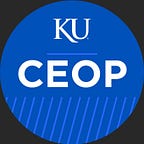Channeling Personal Trials into Community Change
Bryan Vasquez knows that he belongs in the field of biochemistry and policy research. However, this feeling of belonging was not always something he felt at the University of Kansas (KU). Being a first-generation, Latinx student from the rural community of Great Bend, Kan., Bryan said he was faced with the reality that students from similar backgrounds are not well represented in the field of biochemistry. He noticed that many of his peers have parents who are scientists, researchers, and even professors. With this pressure, Bryan who is now in his senior year, did not buckle. Instead, he used it to fuel his academic pursuits.
By taking advantage of opportunities presented to him through The Center for Educational Opportunity Programs including the Heartland College Assistance Migrant Program (CAMP), KU TRIO Supportive Educational Services & STEM, and the McNair Scholars Program, Bryan was able to start his research career early.
With assistance from his CAMP advisor, Bryan was able to successfully submit an application and be admitted into the prestigious Research Experience for Undergraduates (REU) program. Through this experience, Bryan was able to work with Dr. Mario Rivera in KU’s Department of Chemistry the summer before his sophomore year. Throughout the summer his research project focused on examining the interactions between protein and stress levels in cells. He said this experience helped boost his confidence and interest in the field.
Beginning his sophomore year, Bryan had committed to a career path in biochemistry research, which he acknowledged would be difficult, but worthwhile. At the same time, Bryan was also battling Stage 2 Liver Cancer. When it would be understandable for any student to take time off, Bryan continued to find the support he needed to power through his studies, all the while gaining critical research experience. With the support of the Director of the McNair Scholars’ Program, Mulu Lemma, Bryan pursued publication opportunities, ultimately becoming a published co-author on a manuscript in his field. “Mulu helped me find my voice. I didn’t want to be seen as less for asking for help, but McNair helped me solidify my confidence.” Now, as a contributor to his field, Bryan has a vision for what he wants his future to look like.
When asked what the future holds for him, Bryan was clear that he intends to be at the forefront of policy and research in the field of accessible health care. His sights are set on a Ph.D. in Bioengineering, which he said will allow him to gain the skills needed to develop affordable health screenings to those negatively affected by the growing wealth divide in small towns. Through this work, Bryan also hopes to influence health care providers’ cultural competence so the work they are doing aligns with the needs of the diverse populations they serve. “I want my community to have a voice in policy to combat the overrepresentation of big pharma.”
When asked about the driving force behind his hard work, without missing a beat, Bryan stated that his mother and sister have always played a large role. Not only was Bryan faced with cancer affecting his own physical well-being, but during his undergraduate career, he also has traveled back and forth to his hometown to help his mother who fell ill as well. The amount of grit shown by this scholar will be an asset in his future endeavors. Bryan will graduate this spring, which is the first step on his long road to bringing change to his community. Being the first one in his family to complete a bachelor’s degree will be an important milestone for not only Bryan but also for those who inspire him, “It is not a degree for me, it is a degree for my family.”
